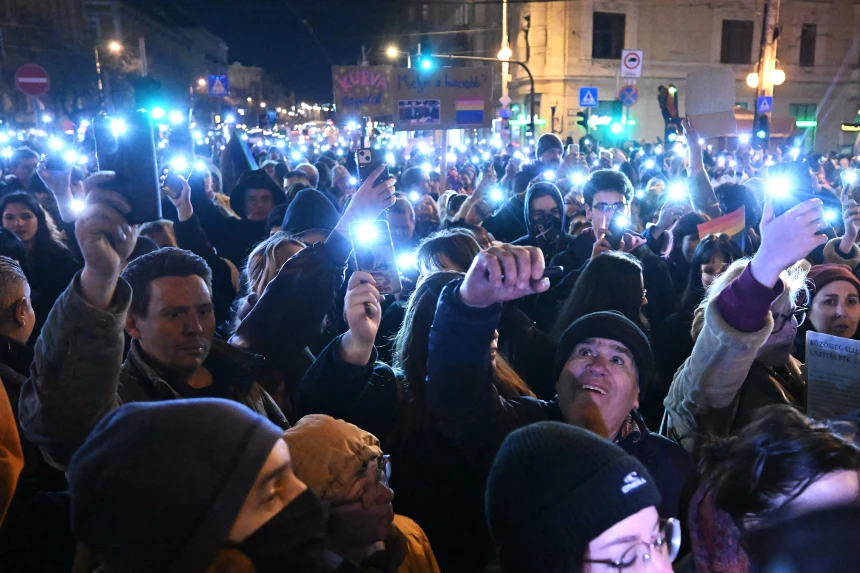Protesters blockaded the Margaret Bridge over the River Danube, blocking traffic and disregarding police instructions to leave the area.
Hungary has passed a controversial anti-LGBTQ law that bans Pride events and allows authorities to use facial recognition software to identify attendees. The law, passed on Tuesday, has triggered a wave of protests in Budapest, where thousands of demonstrators took to the streets in defiance of the new restrictions.
Chanting anti-government slogans, protesters blocked the Margaret Bridge over the Danube, ignoring police orders to disperse. The demonstration reflects growing discontent with Prime Minister Viktor Orbán’s government, which has been widely criticized for its crackdown on LGBTQ+ rights.
The law is part of an escalating anti-LGBTQ+ campaign led by Orbán’s nationalist-populist government. His party, Fidesz, pushed the legislation through parliament in an accelerated procedure, securing a 136-27 vote. The new restrictions closely resemble Russia’s policies against sexual minorities, reinforcing Orbán’s reputation as a close ally of Russian President Vladimir Putin and former U.S. President Donald Trump.
Outrage and Protests in Budapest
The bill sparked strong opposition from lawmakers and activists. Opposing legislators set off rainbow-colored smoke bombs in parliament as a form of protest.
Evgeny Belyakov, a Russian citizen who fled repression and immigrated to Hungary, warned that the law mirrors Russia’s descent into LGBTQ+ suppression.
“It’s quite terrifying to be honest because we had the same in Russia. It was building up step by step, and I feel like this is what is going on here,” he said. “I just only hope that there will be more resistance like this in Hungary, because in Russia, we didn’t resist on time and now it’s too late.”
What Does the Law Say?
The new legislation modifies Hungary’s assembly laws, making it illegal to organize or attend any event that violates the country’s controversial “child protection” law. Passed in 2021, this law prohibits the depiction or promotion of homosexuality to minors under 18 years old.
Under the latest amendment:
- Attending a banned event could result in fines up to 200,000 Hungarian forints ($546).
- Authorities can use facial recognition software to identify participants.
- Funds collected from fines will reportedly be redirected toward “child protection” initiatives.
LGBTQ+ Activists Condemn “Fascist” Law
Human rights groups have condemned the new law, arguing that it targets and scapegoats the LGBTQ+ community to silence critics of Orbán’s government.
Budapest Pride organizers called the move “state-sponsored oppression” and said the ban is designed to eradicate LGBTQ+ visibility in Hungary.
“This is not child protection; this is fascism,” wrote the Budapest Pride organizing committee in a statement.
Jojó Majercsik, a spokesperson for Budapest Pride, told The Associated Press that despite Orbán’s efforts to marginalize LGBTQ+ people, the community has received overwhelming support from allies and citizens.
“Many, many people have been mobilized. Compared to the attacks of previous years, we’re seeing more messages from people saying, ‘Until now, I haven’t gone to Pride, but this year I’ll be there—and I’ll bring my family,’” Majercsik said.
The Government’s Ongoing LGBTQ+ Crackdown
The new legislation is just the latest in a series of anti-LGBTQ+ laws passed by Orbán’s government.
In 2022, the European Commission sued Hungary over its 2021 “child protection” law, arguing that it discriminates based on sexual orientation and gender identity. The law:
- Bans the “depiction or promotion” of LGBTQ+ topics in media content accessible to minors, including TV, films, advertisements, and literature.
- Prohibits LGBTQ+ education in schools.
- Forbids the public depiction of gender identities different from birth sex.
In addition, Hungarian booksellers have faced heavy fines for selling books with LGBTQ+ themes without placing them in sealed packaging. Critics argue that these policies intentionally conflate homosexuality with pedophilia—a tactic widely condemned as misleading and harmful.
Hungary’s government insists that these laws are necessary to protect children from “sexual propaganda.”
Is Orbán Distracting the Public from Economic Struggles?
Many political analysts believe Orbán is using LGBTQ+ issues as a distraction from Hungary’s worsening economic crisis.
Similar to Putin’s tactics in Russia, Orbán has framed LGBTQ+ rights as a threat to traditional values while his government faces mounting economic pressure. Hungary is struggling with:
- High inflation
- A cost-of-living crisis
- Widespread dissatisfaction with education and healthcare services
Tamás Dombos, a project coordinator at the LGBTQ+ rights group Háttér Society, argues that Orbán’s strategy is designed to shift focus away from real issues.
“It’s a very common strategy of authoritarian governments—to avoid talking about the real problems that affect people: inflation, the economy, the terrible state of education and healthcare,” Dombos said.
He also warned that the use of facial recognition technology at banned events could set a dangerous precedent, allowing authorities to target other protests deemed “unlawful” by the government.
“Orbán has been here for 15 years, lying to people, letting the country rot, and then launching these hate campaigns to distract the public,” Dombos added.
What’s Next for Hungary?
As Hungary’s 2026 election approaches, Orbán’s government is expected to double down on culture war issues to maintain control. However, rising public resistance and international condemnation could weaken his grip on power.
With Hungary increasingly resembling Putin’s Russia, activists fear that LGBTQ+ rights and broader civil liberties will continue to deteriorate. Yet, the growing wave of protests suggests that many Hungarians are ready to fight back against Orbán’s repressive policies.
